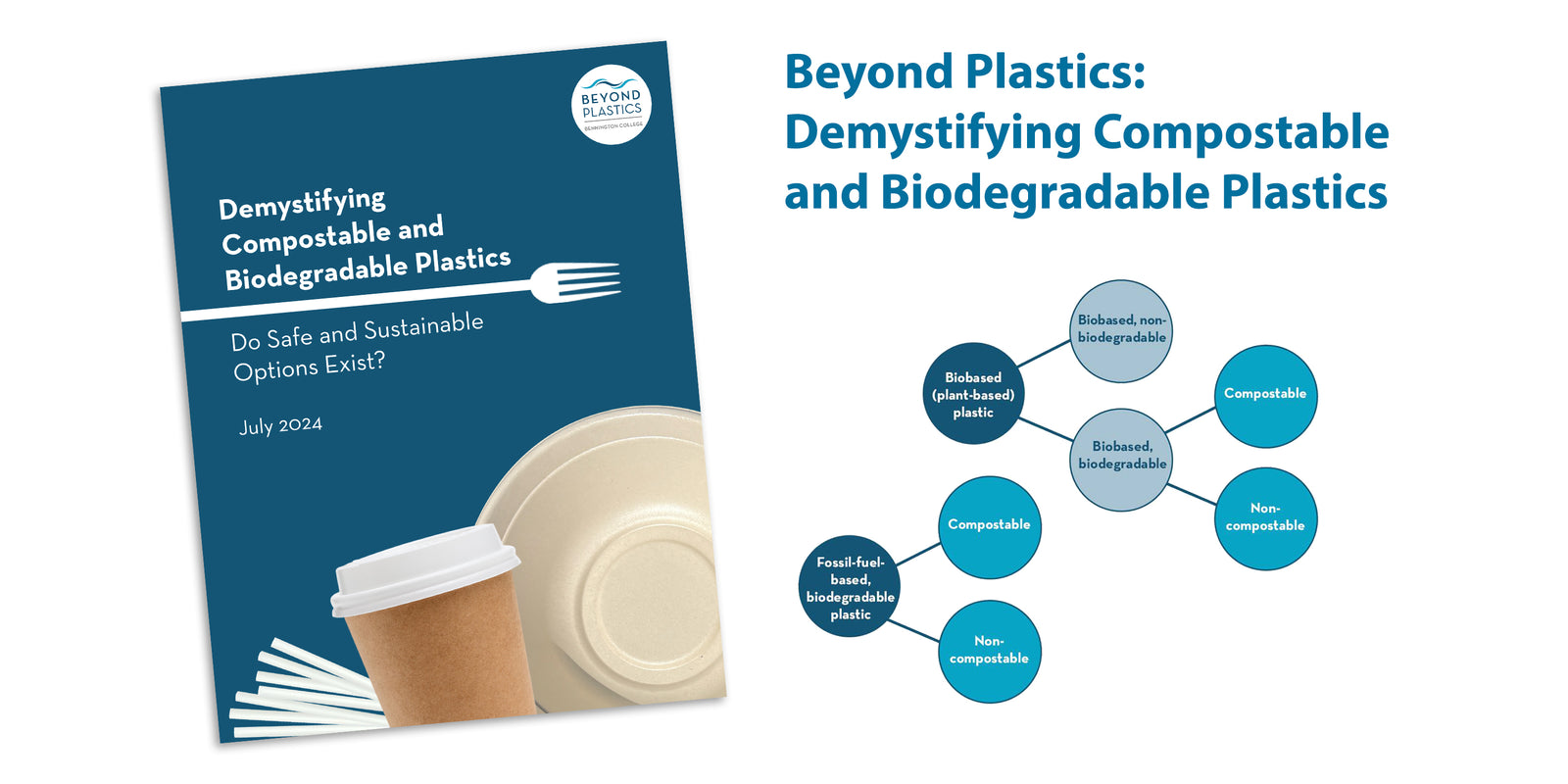Beyond Plastics, an advocacy group dedicated to eliminating plastic pollution, recently released a report on bioplastics, which are marketed as a planet-friendly alternative to traditional plastics.
The report, “Demystifying Compostable and Biodegradable Plastics,” introduces bioplastics and explores their implications for human and environmental health, waste management, and the larger plastic pollution crisis.
In short, the report concludes that bioplastics are not a solution to plastic pollution and that further research, legislation, and disclosure is needed to determine if they are a preferable alternative to conventional plastics. In the meantime, the best solution to plastic pollution is to stop producing new plastics and eliminate disposable, single-use plastics.
Here is our summary of the key points in the report:
What are bioplastics?
Compostable and biodegradable plastics are marketed as eco-friendly alternatives to traditional plastics.
“Bioplastic” refers to materials that are:
- Biobased (derived at least partially from renewable plant materials); or
- Biodegradable; or
- Both
According to the definition above, bioplastics may be biobased but not biodegradable or biodegradable but made from fossil fuels. This is misleading because many consumers believe that all bioplastics are made from plants and biodegrade in the environment.

The terms “bioplastic,” “biodegradable,” and “compostable” are not federally regulated or defined, meaning that people and companies can use them in misleading ways without any consequences.
Many manufacturers claim that bioplastics:
- Degrade more quickly in the environment than conventional plastics
- Have a smaller carbon footprint than conventional plastics
- Are made of safer materials (as opposed to plastics made from fossil fuels)
However, the above statements are not necessarily true or supported by evidence. Research shows that some bioplastics may perform similarly or even worse than conventional plastics in the environment.
Bioplastics are made in the same way as traditional plastics, meaning that they contain chemical additives, such as fillers, plasticizers, and dyes.
Are bioplastics safer than traditional plastics?
Less is known about the chemicals used in bioplastics than conventional plastics. Research has shown that some bioplastics are more toxic than conventional plastics, while other bioplastics are safer. Read the full report for a more complete summary of recent research on the toxicity of bioplastics.
Similar to conventional plastic, there are many formulations for bioplastic that each have unique chemical compositions. Manufacturers are not required to disclose their formulations.
Are bioplastics compostable?
Not all biodegradable plastic is compostable. “Biodegradable” is a vague term that means that a material will eventually break down in the environment with no specific timeline. “Compostable” means that a material will break down within a specific timeline under specific conditions. However, those conditions vary greatly between commercial composting facilities and at-home composting systems.
“Compostable” plastics are rarely designed for at-home compost, meaning they are only compostable at commercial facilities. Few communities have access to such facilities, and most facilities do not accept compostable packaging in order to avoid contamination from microplastics and chemicals.
How are bioplastic products certified?
Industry standards and certifications exist for biobased, biodegradable, and compostable products, including the American Standard Testing Material (ASTM), International Organization for Standardization (ISO), and US Department of Agriculture (USDA) BioPreferred standards.
These standards are voluntary, as there is little regulation to enforce them. California, Washington, and Colorado enforce ASTM standards for products marketed as compostable, but most states do not.
The Biodegradable Products Institute (BPI, a major certification program for compostable products, has “clear conflicts of interest,” according to Beyond Plastics. The report points out that BPI’s board members include bioplastics manufacturers, petrochemical companies, commercial composters, and consumer brands that use bioplastic packaging.
Are bioplastics a solution to plastic pollution?
The best approach to plastic pollution is to eliminate all types of single-use plastics whenever possible before switching to another type of plastic.
When plastics cannot be eliminated, some types of bioplastics may be less negatively impactful on human and environmental health. The relative impact of biobased or biodegradable plastics compared to conventional plastics must be evaluated on a case-by-case basis. This requires manufacturers to disclose their chemical formulas, as well as additional research into the impact of bioplastics.
Some ways of eliminating single-use plastics include:
- Reuse systems that replace disposable containers and packaging with returnable and refillable options
- Legislation to mandate and fund reuse infrastructure, such as extended producer responsibility (EPR) packaging reduction bills and bottle return bills.
- Replacing single-use plastics with non-plastic alternatives, such as paper and cardboard.
Beyond Plastics also calls for these additional actions from policymakers:
- The Federal Trade Commission (FTC) should update the Green Guides with new language on bioplastics and compostability. The Green Guides, which were last updated in 2012, provide important guidelines around environmental marketing claims for companies, customers, and courts.
- The Environmental Protection Agency (EPA) should conduct a federal study on the health and environmental impacts of bioplastics.
- Elected officials should introduce and enact legislation requiring manufacturers to disclose the chemical compositions of bioplastics.
- The USDA National Organic Standards Board (NOSB) should resist pressure from bioplastics manufacturers to weaken composting regulations.
What does this mean for Meliora Cleaning Products (and you)?
At Meliora Cleaning Products, we do not use bioplastics because we don’t believe that substituting one type of plastic for another is a real solution. Instead, we avoid putting any type of plastic in our products whenever possible.
Our cleaning products are free of single-use plastic, and most of our products do not contain any plastic. We make powders and soaps instead of pods and strips made with dissolvable PVA. Our packaging and shipping materials are primarily paper, cardboard, glass, and steel. We prioritize reusable and refillable products, like tablet refills and our closed loop bucket program.
We also advocate for policies that mandate plastic reduction and ingredient disclosure, such as the Packaging Reduction and Recycling Infrastructure Act in New York and the Cleaning Products Right to Know Act in California. Our aim is to provide solutions for people who want them now while leveraging our influence to hold companies accountable for their products and practices.
More from Beyond Plastics
- How to Take Action
- Brochure: A Quick Guide to 'Biodegradable' and 'Compostable' Plastics
- Video: Are Bioplastics Really Better Than Traditional Plastics?
- Report: Hold The Plastic, Please: A Restaurant’s Guide to Reducing Plastic
- New York State Packaging Reduction & Recycling Infrastructure Act

